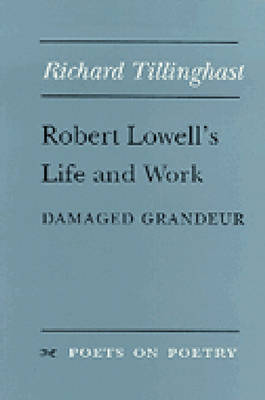Poets on Poetry
2 total works
Robert Lowell was regarded by many as the greatest American poet of his generation. Somehow or other...in the middle of our worst century so far, his contemporary and friend Elizabeth Bishop wrote, we have produced a magnificent poet. The scion of a distinguished New England family, Lowell crafted his poetry to comment on the nation's fate and even to influence the course of American politics. Along with Anne Sexton, John Berryman, and Sylvia Plath, he was a pioneer in the movement later known as Confessional Poetry, and his political gestures were often timely and controversial: his refusal of President Johnson's invitation to the White House came to symbolize the opposition of writers and intellectuals to the Vietnam War. Since Lowell's death in 1977, his reputation has suffered a decline; yet arguably no poet living today writes with the same authority, the same sense of grandeur.
Robert Lowell's Life and Work: Damaged Grandeur is a critical memoir by acclaimed poet Richard Tillinghast, a friend and student of Lowell's in the 1960s. Tillinghast shows how Lowell's gift for the grand gesture was tragically intertwined with the manic-depressive illness that afflicted him throughout his adult life- hence the damaged grandeur of the title. This book offers a radical re- examination of Lowell's poetic career and argues for the restoration of this complex and troubled poet to a pre-eminent position in American letters.
Richard Tillinghast's books of poetry include Our Flag was Still There, Sewanee in Ruins, The Knife and Other Poems, and Sleep Watch. He writes regularly for The New York Times, Atlantic Monthly, and The New Republic. He is Professor Emeritus of English, University of Michigan, and is the recipient of a fellowship from the John Simon Guggenheim Foundation.
Robert Lowell's Life and Work: Damaged Grandeur is a critical memoir by acclaimed poet Richard Tillinghast, a friend and student of Lowell's in the 1960s. Tillinghast shows how Lowell's gift for the grand gesture was tragically intertwined with the manic-depressive illness that afflicted him throughout his adult life- hence the damaged grandeur of the title. This book offers a radical re- examination of Lowell's poetic career and argues for the restoration of this complex and troubled poet to a pre-eminent position in American letters.
Richard Tillinghast's books of poetry include Our Flag was Still There, Sewanee in Ruins, The Knife and Other Poems, and Sleep Watch. He writes regularly for The New York Times, Atlantic Monthly, and The New Republic. He is Professor Emeritus of English, University of Michigan, and is the recipient of a fellowship from the John Simon Guggenheim Foundation.
Poetry and What Is Real presents celebrated poet Richard Tillinghast's exploration of major figures in twentieth-century American, English, and Irish poetry. In engaging critical essays, Tillinghast discusses prominent British and American modernists such as Yeats and Auden, as well as neglected masters like John Crowe Ransom.
Tillinghast's book is unique in its focus on Middle Generation poets, who followed the major figures like Yeats, Pound, and Eliot. Lowell and Heaney receive critical attention here, as do Elizabeth Bishop, James Dickey, Donald Hall, Sylvia Plath, Philip Levine, Derek Mahon, and other writers born from the late 1910s through 1940. In autobiographical essays such as "A Letter from Galway" and "Travel and the Sense of Place," Tillinghast also takes into account his own preoccupations as a practicing poet .Richard W. Tillinghast's seven books of poetry include, most recently, The Stonecutter's Hand and Today in the Cafe Trieste. He is also the author of Robert Lowell's Life and Work: Damaged Grandeur. He is Professor Emeritus of English at the University of Michigan and a frequent contributor to the New York Times. He is also the recipient of a fellowship from the John Simon Guggenheim Foundation."
Tillinghast's book is unique in its focus on Middle Generation poets, who followed the major figures like Yeats, Pound, and Eliot. Lowell and Heaney receive critical attention here, as do Elizabeth Bishop, James Dickey, Donald Hall, Sylvia Plath, Philip Levine, Derek Mahon, and other writers born from the late 1910s through 1940. In autobiographical essays such as "A Letter from Galway" and "Travel and the Sense of Place," Tillinghast also takes into account his own preoccupations as a practicing poet .Richard W. Tillinghast's seven books of poetry include, most recently, The Stonecutter's Hand and Today in the Cafe Trieste. He is also the author of Robert Lowell's Life and Work: Damaged Grandeur. He is Professor Emeritus of English at the University of Michigan and a frequent contributor to the New York Times. He is also the recipient of a fellowship from the John Simon Guggenheim Foundation."

